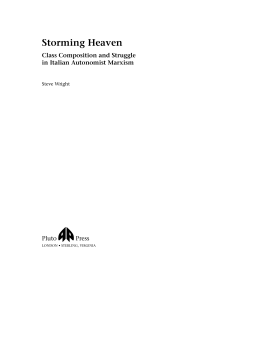
Additional Information
Book Details
Abstract
'The emergence of a new wave of anti-capitalist activism on the streets of Seattle, Prague and Genoa has been accompanied by a growing interest in "autonomist Marxism." Steve Wright’s study brilliantly illuminates the history, complexity and internal debates of this tradition ... A vital, lucid contribution to understanding how the red threads of Marxism are being rewoven into the fabric of twenty-first century radicalism.'
Nick Dyer-Witheford, author of Cyber-Marx
Storming Heaven is the first comprehensive survey of Italian autonomist theory, from its origins in the anti-stalinist and workerist left of the 1950s to its heyday twenty years later. Autonomist marxism was a political tendency which privileged themes--self-organisation, construction of identity, grassroots politics, subjects in struggle--which in many ways can be seen as the precursor of today's debates around direct action protest. Emphasising the dynamic nature of class struggle as the distinguishing feature of autonomist thought, Wright explores how its understanding of class politics developed alongside emerging social movements.
Offering a critical and historical exploration of the tendency's emergence in postwar Italy, Storming Heaven moves beyond the crisis of traditional analytical frameworks on the left, and assesses the strengths and limitations of autonomist marxism as first developed by Antonio Negri, Mario Tronti, Sergio Bologna and others.
'The emergence of a new wave of anti-capitalist activism on the streets of Seattle, Prague and Genoa has been accompanied by a growing interest in "autonomist Marxism." Steve Wright’s study brilliantly illuminates the history, complexity and internal debates of this tradition ... A vital, lucid contribution to understanding how the red threads of Marxism are being rewoven into the fabric of twenty-first century radicalism.'
Nick Dyer-Witheford, author of Cyber-Marx
Storming Heaven is the first comprehensive survey of Italian autonomist theory, from its origins in the anti-stalinist and workerist left of the 1950s to its heyday twenty years later. Autonomist marxism was a political tendency which privileged themes--self-organisation, construction of identity, grassroots politics, subjects in struggle--which in many ways can be seen as the precursor of today's debates around direct action protest. Emphasising the dynamic nature of class struggle as the distinguishing feature of autonomist thought, Wright explores how its understanding of class politics developed alongside emerging social movements.
Offering a critical and historical exploration of the tendency's emergence in postwar Italy, Storming Heaven moves beyond the crisis of traditional analytical frameworks on the left, and assesses the strengths and limitations of autonomist marxism as first developed by Antonio Negri, Mario Tronti, Sergio Bologna and others.
Table of Contents
| Section Title | Page | Action | Price |
|---|---|---|---|
| Contents | viii | ||
| Introduction | 1 | ||
| 1. Weathering the 1950s | 6 | ||
| 2. Quaderni Rossi and the Workers' Enquiry | 32 | ||
| 3. Classe Operaia | 63 | ||
| 4. New Subjects | 89 | ||
| 5. The Creeping May | 107 | ||
| 6. Potere Operaio | 131 | ||
| 7. Toni Negri and the Operaio Sociale | 152 | ||
| 8. The Historiography of the Mass Worker | 176 | ||
| 9. The Collapse of Workerism | 197 | ||
| 10. Conclusion | 224 | ||
| Bibliography | 228 | ||
| Index | v | ||
| A/traverso 201 | 201 | ||
| Accornero, A. 81 | 81 |
